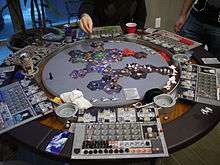Amerigame
An Amerigame, short for American-style board game, is a loose category of tabletop game that generally features a prominent theme, encourages direct conflict between players (even in some co-op games such as Dead of Winter), and has a significant degree of luck. It is distinguished from a Eurogame, or German-style board game, in that American-style games often have longer playtimes and mechanics designed to suit the theme.[1] Not all games from the United States fall under this category. Many of the famous games were invented outside USA. Party games like Codenames, Cooperative board games like Pandemic and Family-friendly board games with simpler or abstract rules like Scrabble and Chess are usually excluded.
These games are sometimes referred to as Ameritrash[2], which is used occasionally as a term of affection by some people, and a pejorative by others. The terms Amerigame and thematic game do not carry negative connotations, although neither of these has gained traction.[2] BoardGameGeek cites "Axis & Allies, Dune, Cosmic Encounter, Talisman, and Twilight Imperium" as classic Ameritrash titles.[3]
History


In 1903, American anti-monopolist Lizzie Magie created a game which she hoped would explain the single tax theory of Henry George. It was intended as an educational tool to illustrate the negative aspects of concentrating land in private monopolies. She took out a patent in 1904. Her game, The Landlord's Game, was self-published, beginning in 1906.[4] Lizzie created two sets of rules: an anti-monopolist set in which all were rewarded when wealth was created, and a monopolist set in which the goal was to create monopolies and crush opponents.[5]
According to an advertisement placed in The Christian Science Monitor, Charles Todd of Philadelphia recalled the day in 1932 when his childhood friend, Esther Jones, and her husband Charles Darrow came to their house for dinner. After the meal, the Todds introduced Darrow to The Landlord's Game, which they then played several times. The game was entirely new to Darrow, and he asked the Todds for a written set of the rules. After that night, Darrow went on to utilize this and distribute the game himself as Monopoly. Because of this act the Todds refused to speak to Darrow ever again.[6] After the game's excellent sales during the Christmas season of 1934, Parker Brothers bought the game's copyrights from Darrow.[7] When the company learned Darrow was not the sole inventor of the game, it bought the rights to Magie's patent for just $500.[8]
The idea for Diplomacy arose from Allan B. Calhamer's study at Harvard of nineteenth-century European history under Sidney B. Fay inter alia, and from his study of political geography. The rough form of Diplomacy was created in 1954, and its details were developed through playtesting until the 1958 map and rules revisions. Calhamer paid for a 500-game print run of that version in 1959 after rejection by major companies. It has been published since then by Games Research (in 1961, then a 1971 edition with a revised rulebook), Avalon Hill (in 1976), by Hasbro's Avalon Hill division (in 1999), and now by Wizards of the Coast (in 2008) in the USA, and licensed to other boardgame publishers for versions sold in other countries. Among these are Parker Brothers, Waddingtons Games, Gibsons Games, Asmodée Editions.[9]
Risk was invented by French film director Albert Lamorisse and originally released in 1957 as La Conquête du Monde (The Conquest of the World) in France. It was bought by Parker Brothers and released in 1959 with some modifications to the rules as Risk: The Continental Game, then as Risk: The Game of Global Domination.[10]
Newer Amerigames continue to be created. War of the Ring is a board game first produced by Nexus Editrice (Italy) and currently published by Ares Games in 2004.[11] Eclipse: New Dawn for the Galaxy (commonly known as Eclipse) is a strategy board game produced by Lautapelit.fi. It was designed by Touko Tahkokallio and first released in 2011. The game currently has three expansions — Rise of the Ancients, released in 2012, Ship Pack One, released in 2013 and Shadow of the Rift, released in 2015 — and four mini expansions. It is a 4X game where players must lead their civilization to prevail over the others.[12]
Characteristics
.jpg)
Direct conflict between players
Some examples of Amerigames are: Runewars, Arkham Horror, StarCraft: The Board Game, War of the Ring (First Edition), Last Night on Earth: The Zombie Game, Battlestar Galactica: The Board Game, Dune, Axis & Allies, Battlestations, Cosmic Encounter, Talisman, Twilight Imperium, Divine Right, Tales of the Arabian Nights, Merchant of Venus. Player elimination allows weaker players to gang up on a leading player to get that player eliminated early. In some cooperative games, one or two players take on the role of traitor.[13] The traitors typically win by triggering a failure condition for the other players. In Battlestar Galactica: The Board Game, players who receive a “You Are a Cylon” card when loyalty cards are handed out work in secret to undermine humanity.
High randomness
Amerigame designs tend to emphasize luck and random elements. Uncertainty is a tool for heightening the drama. The random elements of the game will be resource or terrain distribution in the initial setup, random order of a set of events or objectives, etc. Randomizers like dice-rolling or card-draws are commonly used.
Focus on the theme

Amerigames share a core focus on the theme of the game's scenario and dramatic game-play. Themes of combat and direct competition, derived from the setting or the objective, are common. Player conflict is often direct. Game titles tend to be dramatic. Game art and pieces are usually customized to invoke the same feel as the theme and the setting.
Player elimination
Another prominent characteristic of these games is player elimination—eliminating players before the end of the game where a player may be defeated like Diplomacy and Risk or where a player may go bankrupt and thus be eliminated like Monopoly. Most of these games are designed to eliminate players from the game as quickly as possible.
Related to player elimination is that Amerigame scoring systems are often designed with transparent scoring, so that players can target the player who appears to be in a leading position. A second-order consequence is that Amerigames tend to have few paths to victory, and it is often obvious to other players which strategic path a player is pursuing.
Game mechanics
A wide variety of familiar mechanics like rolling dice and moving, capture, or trick taking were introduced in American style games. In games such as Risk or Monopoly, a close game can extend indefinitely. Game mechanics are restricted by the theme.
References
- "Ameritrash" on the BoardGameGeek wiki, BoardGameGeek contributors. Retrieved March 16, 2016.
- BoardGameGeek definition Ameritrash. Retrieved April 29, 2019
- BoardGameGeek glossary, BoardGameGeek. Retrieved March 16, 2016.
- Orbanes, Philip E. (2006). Monopoly: The World's Most Famous Game & How it Got that Way. Da Capo Press. p. 22. ISBN 0-306-81489-7.
- "The secret history of Monopoly: the capitalist board game's leftwing origins". The Guardian. 11 April 2015.
- Pilon 2015, pp. 90–92, 132–133.
- Brady. The Monopoly Book. Page 18.
- Anspach, The Billion Dollar Monopoly Swindle, pages 100–101.
- "Diplomacy". BoardGameGeek. Retrieved January 25, 2008.
- Alan Axelrod (2009). Risk: Adversaries and Allies: Mastering Strategic Relationships. Sterling. ISBN 978-1402754111.
- https://www.boardgamegeek.com/boardgame/9609/war-ring-first-edition
- "Eclipse (2011)". BoardGameGeek, LLC. Retrieved 1 January 2014.
- "THE BEST SECRET IDENTITY BOARD GAMES". IGN. 14 March 2018. Retrieved May 22, 2019.